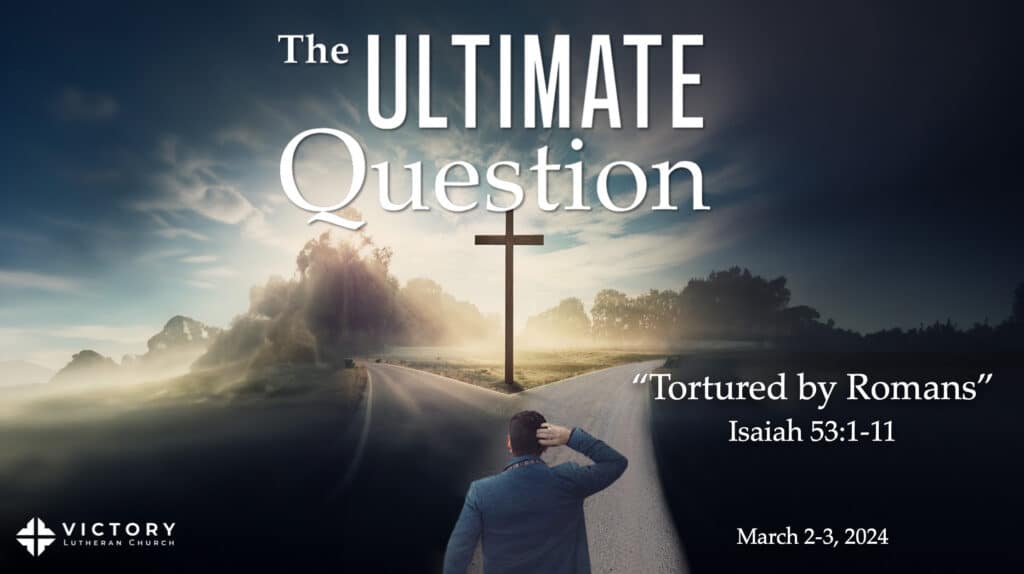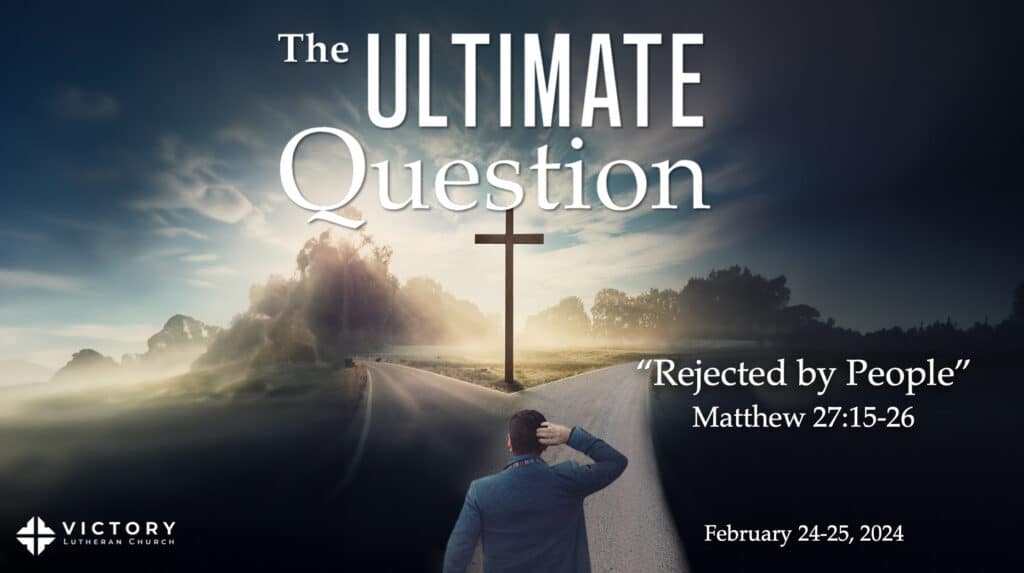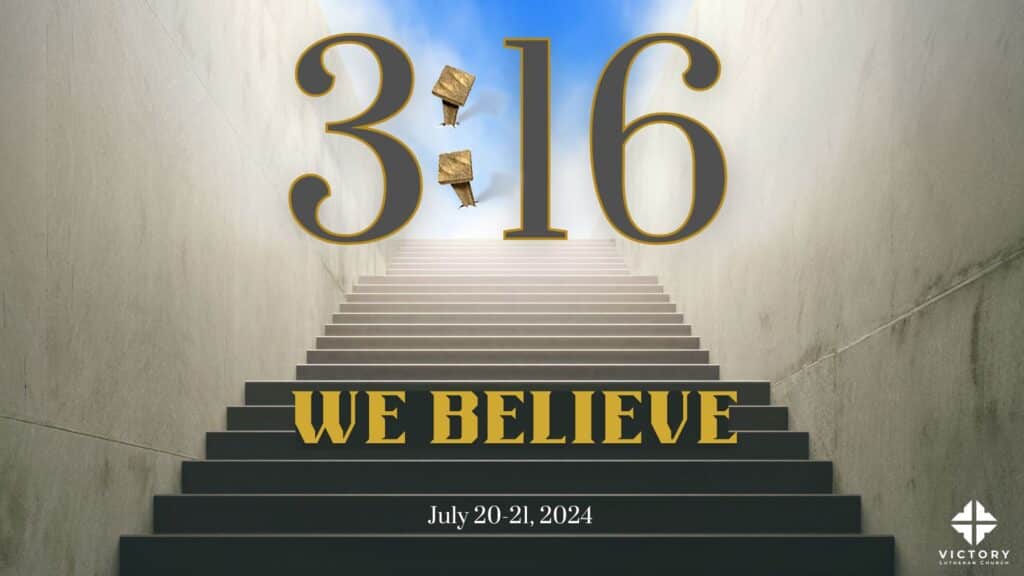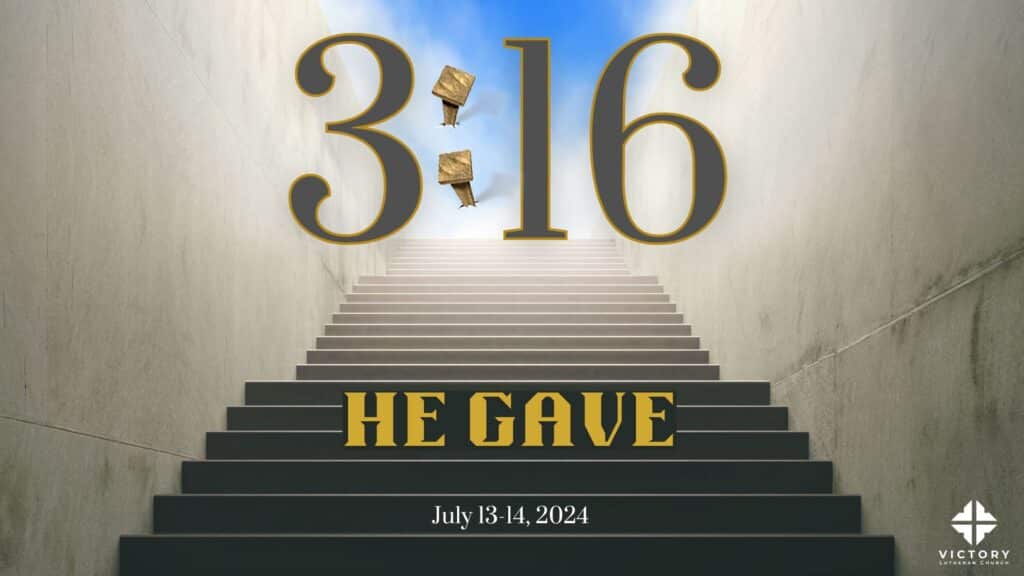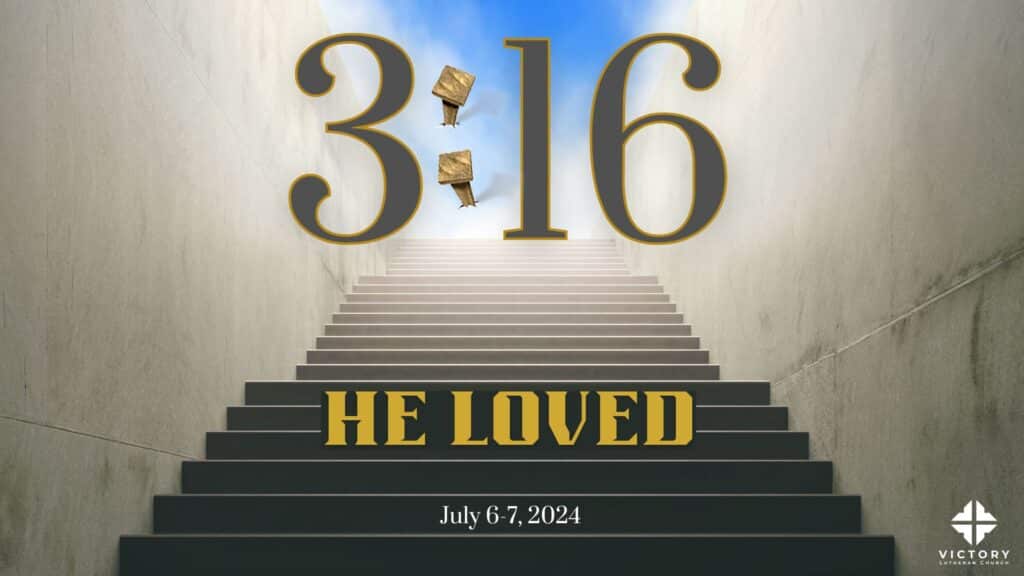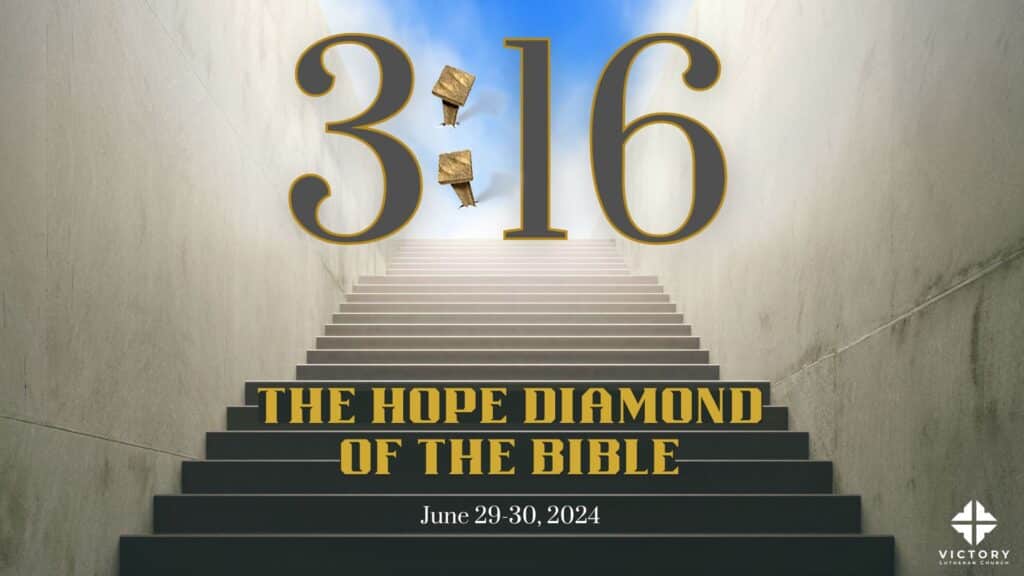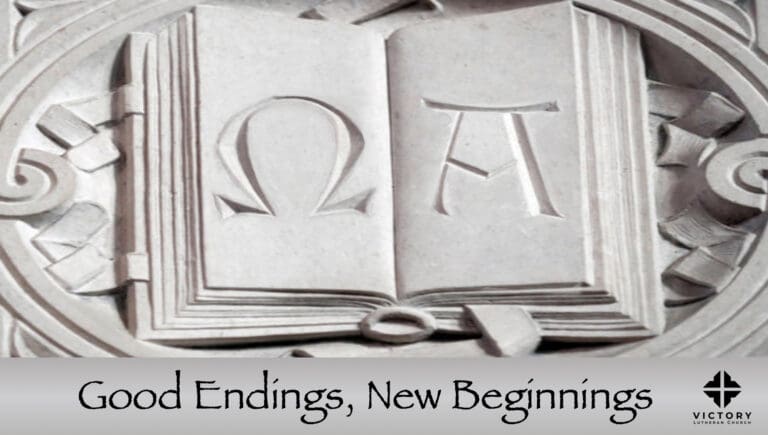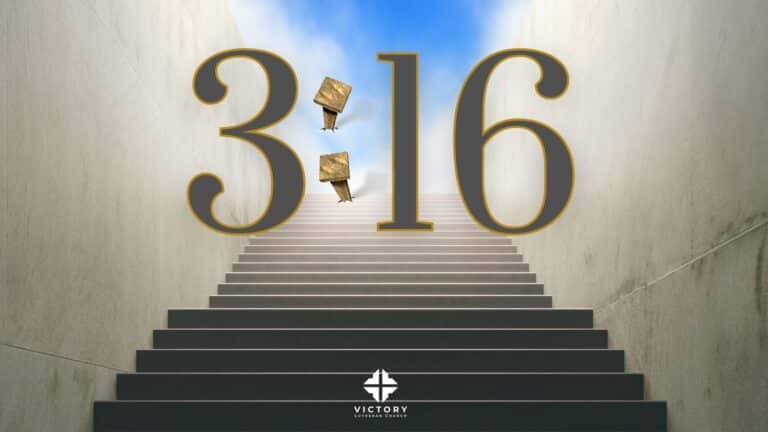Dear friends, grace to you and peace from God our Father and our Lord and Savior Jesus Christ. Amen. This morning we’re going to consider what it means to discern fact from fiction and what it means ultimately to have faith. Just this last week I saw on one of my social media feeds, there’s a picture back from, a video clip from 2002 of a guy chasing, uh, astronaut Buzz Aldrin around with a Bible saying, Hey, Buzz, put your hand on this Bible and, and swear that you actually were on the moon. And of course, you know, Buzz wouldn’t have anything to do with them. And it’s like, okay, see, it’s all a hoax. All the moon, uh, moon landings were a hoax. And I’ll bet you many of you here today believed for years that we landed on the moon, right? But I came across even more evidence this week. It, too, was online, so it must be true.
Turns out Apollo 11 moon landing, the Apollo moon landings were all fake by NASA with the assistance of the CIA. I mean, just think about the evidence, okay? The photos were altered. There’s no stars. in any of the pictures. There are identical backgrounds for locations that were known to be more than 10 miles apart. The moon’s surface during daytime is actually so hot any film in a camera would melt. And the flag placed on the surface as the astronauts had landed and placed it there, it flapped. Despite, and stood outright, despite there being no wind on the moon. And there are people who actually believe this. Distinguishing fact from fiction. And I guess I can understand our reluctance to accept reality that we are given. We grow up thinking some things are true. Find out it’s not always the case. And we eventually become a little less trusting. And we start to question what is true. And we want more than just an explanation or because I said so.
We want evidence. And I think we take pride in the fact that we won’t get fooled again. So today, right now, I just want to give you a little test, see how good you are at discerning fact from fiction. I’ve got a number of statements. And you don’t have to say it out loud, but just in your own head, answer either accept or reject. Okay? Accept or reject. First, Lifesavers candy. Invented by a man whose daughter died choking on a mint. So that hole in the middle of the Lifesavers lets you breathe even if it gets stuck in your throat. Accept or reject? That’s a reject! Even though I believed that as a child growing up. It’s not true. All right, the Jelly Belly Candy Company makes jelly beans flavored like soap, spinach, and sardines. It almost sounds credible, but they actually reject. Although, they do make black pepper and earwax flavor. Who tested that out? No idea why. All right. Those of you who remember Saturday morning cartoons and commercials, the kid who played Mikey in the Life cereal commercials, he actually died when his stomach exploded after consuming Pop Rocks candy and drinking a Coca Cola. Reject. Here’s one I still want to take up with my mom, but she’s with the Lord right now, so I’m gonna have to wait. Swallowing chewing gum. Takes seven years to digest. And then finally passed through your system. Reject. Even though that’s what my mom taught me. On further research, chewing gum, while largely indigestible, still makes its same journey along with everything else.
And I’m not going to say anything more about that. I have one more statement for you to assess. Accept or reject. Jesus is the Son of God who died for your sins and the sins of the world and rose again. And how you answer that question changes everything. You know, the most common response to the person and work of Jesus is really rejection. Most people reject Him. But today I want us to look at a couple of bystanders in the biblical narrative about Jesus crucifixion. That these bystanders, when they encountered Jesus and His cross, their lives were forever transformed and changed. And they became followers of Jesus, not just casual bystanders or hardened skeptics. And these two people that we’re going to consider, when they got up on that Friday morning, I don’t think they thought it was going to be a particularly special day, but their lives are about to be completely transformed and never be the same. And God can still do the same in us today. So let me ask you the ultimate question.
What will you do with Jesus? In this series, we’ve seen the soldiers who dismissed him, the people who rejected him, the Romans who tortured him, and the disciples we looked at last weekend who deserted him. But today, we’re going to study a couple of bystanders who accepted him. So the first is a casual observer by the name of Simon. Simon the Sirene. When we look at Mark chapter 15 and verse 21, we notice that Simon went from observing the story of Jesus unfold to becoming part of it. The Bible says, A certain man from Cyrene, Simon, the father of Alexander and Rufus, was passing by on his way in from the country, and they forced him to carry the cross. Okay, Simon the Cyrene. Cyrene, a fairly large city in Libya, in North Africa, that had a significant Jewish population. And so, possibly, Simon had traveled all the way to Jerusalem because he wanted to participate in that Passover feast. Maybe he’d saved for years to make this trip a reality. Maybe he’d had a dream of one day eating That Passover feast in the Holy City.
But on this Friday morning when he got up, he got caught up in the pedestrian traffic. People had lined up in the streets to watch a march to execution. And Simon stopped to watch the parade himself. But as he watched, he witnessed a man called Jesus of Nazareth carrying his cross outside the city walls to a hill called Golgotha. And Jesus had already been beaten and endured a scourging so severe, other people would have died from it. He was beyond exhaustion as he stumbled right in front of Simon. And now the Roman soldiers had authority to force any citizen into temporary service. So they saw Jesus. He’s faltering. They scan the crowd. They say, Hey you! They point at Simon, you, carry his cross. And I’ll bet Simon wanted nothing to do with that humiliating and gruesome scene. But he didn’t have an option. He couldn’t refuse. And yet in that close encounter with Jesus, Simon’s life was forever changed. Perhaps, he looked into Jesus innocent eyes.
Maybe he felt the blood of Jesus run off the cross and onto his own neck. Perhaps he heard Jesus whisper to him, Thank you, Simon. And then I wonder if he stayed and listened as Jesus prayed from the cross that God would forgive these people for what they were doing. Whatever it was, it appears that Simon became a follower of Jesus, accepted him, and his life was transformed.It’s interesting, in this verse that we read in Mark, the Bible says, Simon, the father of Alexander and Rufus. Did you ever think about what that phrase is all about? I mean, imagine I’m out at a restaurant here in the East Valley, and, and you come over to the table to say hi, and I’m with somebody, I say, Hey, I want to introduce my friend to you. This is the father of Richard Iverson. Richard who? It doesn’t mean anything to you unless you know a Richard Iverson. Well, Mark introduces Simon as the father of Alexander and Rufus, so it’s safe, I think, to assume that Alexander and Rufus were well known to the early readers of Mark’s gospel, which is the early church. In fact, in Romans 16, the Apostle Paul writes, greet Rufus. Chosen in the Lord, and his mother, who has been a mother to me too. And so back from Simon’s encounter on that first Good Friday in Jerusalem, he went from watching the story, to participating in it, to then following Jesus, and he and his family were converted.
Simon came to the Holy City to sacrifice his Passover lamb, but instead he came face to face with the Lamb of God who was sacrificed for him. And that is still possible this day. For Jesus to be seen and known. And perhaps this might be a day for some of you here that the lights will go off, the Holy Spirit will illuminate your heart. Say, Jesus did this for me, and your life will be forever changed. Another bystander at the cross accepted Jesus as the Son of God. We don’t know his name, only his rank. He was the Roman centurion, perhaps a hardened skeptic. We read in verse 39, and when the centurion who stood there in front of Jesus saw how he died. He said, surely this man was the Son of God. Here’s a man who has changed from at least an uninterested, disinterested, observer, perhaps a hostile skeptic, who became a humble believer. This centurion was the commander of this Roman execution squad tasked with killing this Nazarene. And now the Gospels tell us that the Roman soldiers brutalized Jesus, who were under the centurion’s command. They struck him with their fists in the face. We’re looking at this big time at our Lenten services. They spit on him. They scourged him. They mocked him. And the centurion had done nothing to prevent it, possibly had been a part of it at the very least. He allowed his men to mock and abuse this Jewish Insurrectionist, that some had said was the Son of God, but as this centurion stood in front of the cross of Christ, something happened to his heart. I wonder what it was. I mean, the centurion must have seen hundreds, if not thousands, die such a death. What was it so different about Jesus that changed his heart?
The centurion, he’d been there for all that Jesus experienced. Had it been the composure of Jesus as he was falsely accused and then violently beaten, keeping silent? Maybe it was the meekness of Jesus. Did he seem like a man who had the power to put a stop to all of this with just a single word but didn’t? I’m sure he had never heard a man pray for the forgiveness for his executioners like Jesus did. He would have been one of the few close enough to hear Jesus say to the thief being crucified next to him, Today you’ll be with me in paradise. And then in the middle of the day as Jesus hangs on the cross, the entire sky turning black, the ground trembling under his feet. Never had he heard a dying man in his last breath cry out the words, Tetelestai, it is finished. You know that translation, it can lose something if we picture Jesus saying it is finished like it would a general losing a battle. Or we’ve got March Madness coming up. There’s going to be 64 coaches who at one point are going to say, guys, it’s finished. We’re going to lose.But if we hear that word, to tell us that it is finished, as a cry of defeat, we miss the whole point. Because it’s really a cry of victory. Jesus has declared, it’s finished. The plan of salvation set out before all creation is now finally accomplished. After the battle is won, this is the word that would be shouted in the streets.
It is finished means the battle is ended. The victory has been won. Let the celebrations begin. And after witnessing these things, this Roman soldier understood what the religious leaders had missed. He believed what the crowd refused to accept. And when confronted with life’s ultimate question, what will you do with Jesus? He concludes, surely this man is the Son of God.Those kinds of transformations have occurred ever since the cross of Christ. I want to finish up by reminding you of a few notable stories on this. A long list of hardened skeptics who became committed followers of Christ when they took an honest look at Jesus. And as we approach Easter, I encourage you to do the same. I’ve got a book in my, uh, library that I’ve read, and someone showed me, said, you gotta pick this up. I said, I know, it’s a great book. It’s called The Case for Easter by Lee Strobel. It’s a short read. I commend it to you. Lee Strobel, he was an award winning journalist for the Chicago Tribune, and for most of his life, he said, I, he was an atheist. But after his wife became a Christian, he started to see some positive changes in her life, and so, after a few months, Lee decided to attend church with his wife, partly because he was curious, partly because he was kind of looking to be able to poke holes at her newfound faith. However, in that worship service, Lee was confronted for the first time with Jesus claims that his life, death, and resurrection procured his salvation. And for those who would believe in him. And after that service, Lee made a decision. He vowed to check out this Christian faith as a journalist would. He decided to examine the evidence and see for himself. And interestingly, he began his search with a prayer asking a God he didn’t even know if he believed in to reveal himself if he did, in fact, exist.
That’s actually a good, honest prayer. From a hardened skeptic. And you know, from that moment on, Lee began a journey to answer life’s ultimate question. And after two years of intensive research, Lee Strobel himself became a Christian. And then there’s a man I grew up with, his books, Josh McDowell. Some of you may know that name. Josh was so annoyed with his friend’s attempts to evangelize him that he decided he’s gonna disprove Christianity. So he studied history. He flew to Israel, participated in archaeological digs, did all kinds of research. And years later, he was fully convinced and became a Christian himself. And he wrote two volumes on the evidence that convinced him, called Evidence That Demands a Verdict. Volumes 1 and 2. And then there’s Viggo Olsen, a surgeon who felt compelled to study the evidence for Christianity to try to disprove it to his in laws. He was motivated. And after his research, he became firmly convinced and himself became a follower of Christ. And he wrote a book about it called The Agnostic Who Dared to Search. There are others, but I want to just note two. One is a man named Stephen Massoud. He was raised strictly Muslim, but wanted to know the truth for himself. So he studied Islam at length and was never convinced. He began to study Christianity, and finally he was convinced and became a Christian, and he was beaten and nearly killed by people in his hometown because of his change of religion, but he stuck to it. And he wrote a book called Into the Light. This And let me tell you about Ravi Maharaj, a Hindu. He had advanced in his religion to the degree that people thought he had nearly evolved to the state of Nirvana. People in his hometown worshipped him when he just walked by. But Ravi never knew for sure that what he believed and taught was true. And so he set about on the pursuit of truth. And finally, he became convinced and became a Christ follower. And he wrote a book about his search called Death of a Guru. I could keep going on with other stories of people who, after honestly looking at Jesus, being an honest skeptic, were completely transformed and became followers of Jesus and trusted Him for salvation.
So this year, for you, what’s your story? If you are skeptical, call. I challenge you to have at least enough honesty or integrity to sincerely examine the evidence for Jesus. Now, I’m not going to say faith doesn’t require believing in something you don’t see. That’s actually what the Bible says the essence of faith is. But faith is not blind faith in just saying, I’m just going to choose to believe this no matter what anything else says. It’s an informed faith. Certainly, it’s a faith statement for you to believe that Jesus was born, God became human, lived the life you and I can’t seem to live, died the death we all deserved, and then rose again from the dead, and that all of us who look to Him in faith will be forgiven our sins, granted His righteousness, and promised resurrection. All of those are faith statements, absolutely. But it’s not blind faith, it’s informed faith. And so, wherever you are at on your own spiritual journey I encourage you to look to Jesus in my prayer, even in this message, that your faith would be strengthened no matter where you’re at, skeptic, just an uninterested bystander, a casual believer, or someone who’s just consumed with love and gratitude for Christ, for what he’s done for you.
My prayer is that you will grow closer to Christ this season of Lent leading up to Easter than ever before. For Jesus himself is the central figure in all of human history. I close with excerpts from a poem written by James Alan Francis, called One Solitary Life. He was born in an obscure village, the child of a peasant woman. He grew up in still another village, or he worked in a carpenter shop until he was thirty. Then for three years he was an itinerant preacher. He never wrote a book, he never held office, he never had a family or owned a house. He didn’t go to college, he never visited a big city. He never traveled more than 200 miles from the place where he was born. He did none of the things one usually associates with greatness. He had no credentials but himself. He was only 33 when the tide of public opinion turned against him. His friends ran away, he was turned over to his enemies, and went through the mockery of a trial. He was nailed to a cross between two thieves. While he was dying, his executioners gambled for his clothing, the only property he had on earth. When he was dead, he was laid in a borrowed grave for the pity of a friend. Twenty centuries have come and gone. And today, Jesus is the central figure of the human race. All the armies that ever marched, all the navies that ever sailed, all the parliaments that ever sat, all the kings that ever reigned, put together, have not affected the life of man on earth as much as that one solitary life. Join me in prayer. Father in heaven, we thank you for this opportunity to gather together and hear the truths of your Word. Help us, Lord, to navigate the complexities of our world with wisdom, discernment, being able to distinguish what is true and what is false, and then guide us in seeking evidence and understanding, and then grow our faith in the knowledge of you and what you’ve done for us. Grant us the courage to embrace truth, even when it challenges our preconceptions. And may we always stand firm in the knowledge and hope that Jesus is the ultimate truth, the Son of God who died for our sins and rose again. In his name we pray. Amen.




